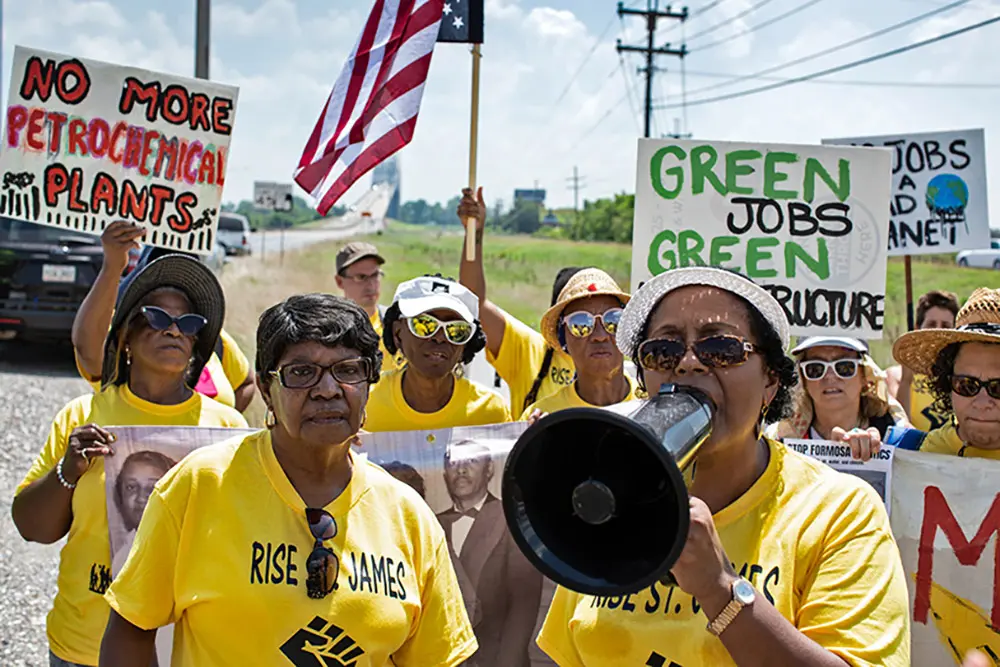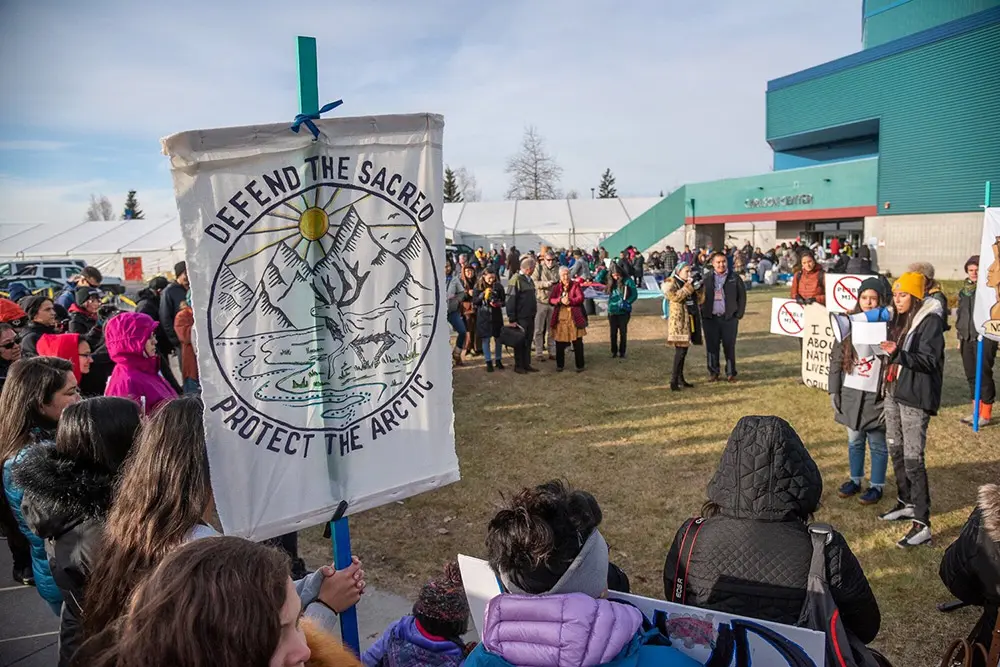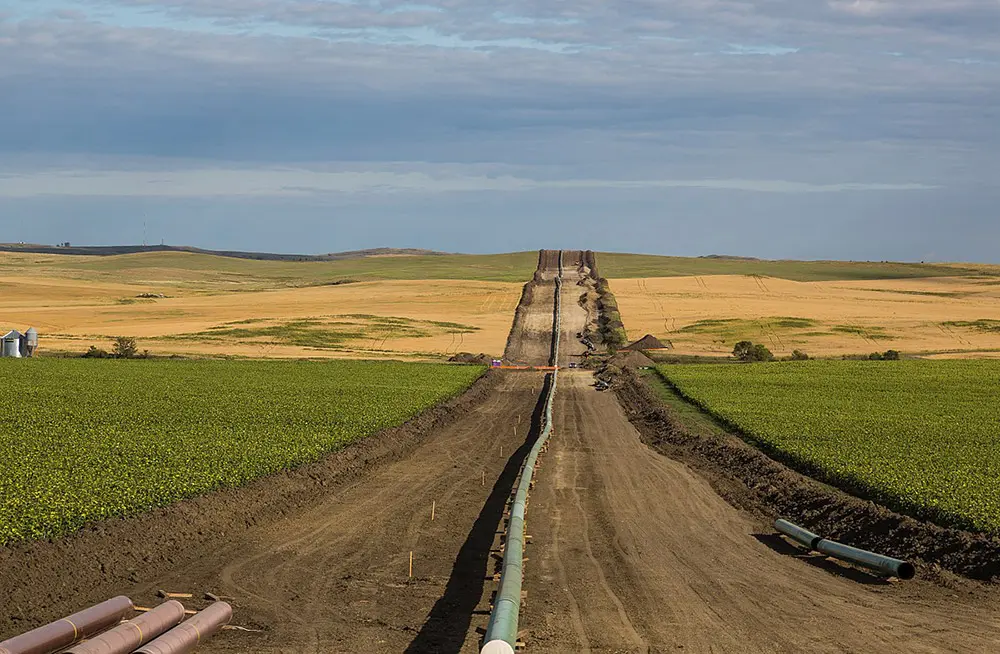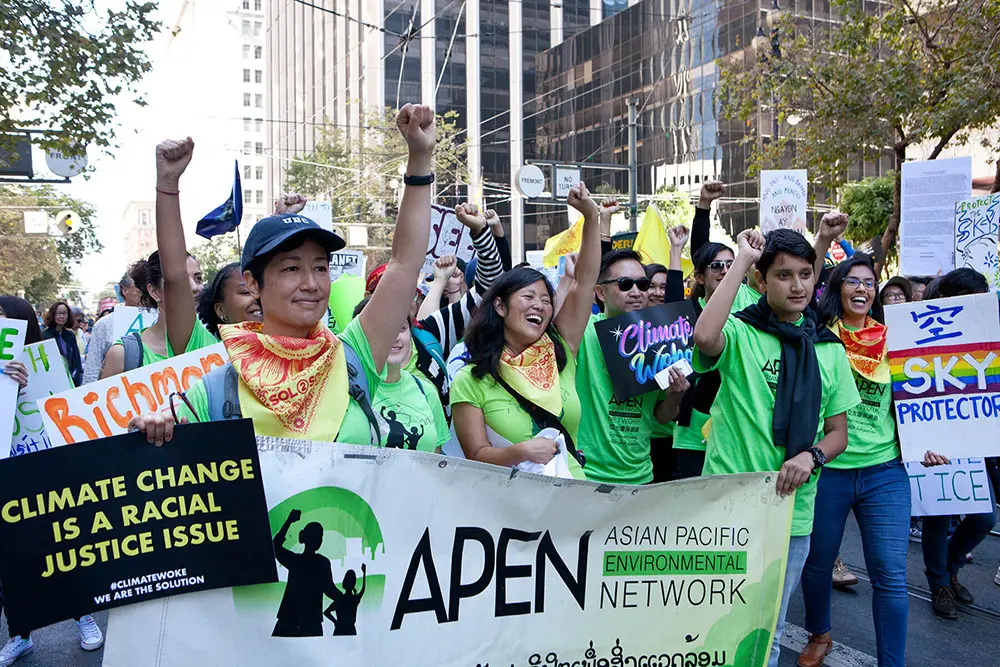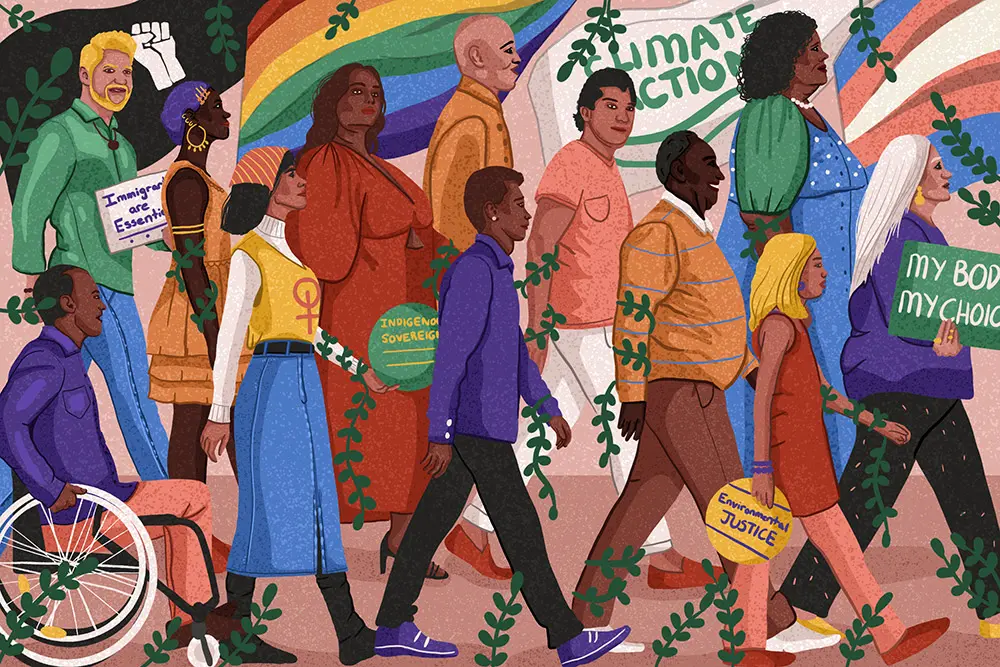Climate resilience as Fossil Fuel Resistance
Fossil Fuel Resistance is a powerful tool to:

What it is: When we talk about “the fossil fuel resistance” in this context, we’re referring to the grassroots movements that are organizing against the fossil fuel industry (i.e. the corporations that procure and sell hydrocarbon-containing products like coal, oil, and natural gas), and in particular, the expansion of infrastructure created to extract, transport, and burn more fossil fuels.
The fossil fuel resistance is organizing protests, rallies, marches, workshops, informational sessions, and other public events, they are engaging in acts of civil disobedience, they are filing lawsuits and legal challenges, they are mobilizing folks to contact elected officials, submit public comments, and attend public hearings, they are utilizing strategic media engagement to raise awareness and shape public opinion, and they are collaborating and coalition-building to forge a broad and fierce resistance.
The fossil fuel resistance takes aim not just as fossil fuel corporations and projects, but also the institutions that aid and abet the fossil fuel industry, like big banks, media platforms, and advertising firms, as well as the governing bodies that continue to approve new fossil fuel projects, funnel taxpayer dollars into fossil fuel subsidies, and fail to keep surrounding communities safe from the many harms associated with the extraction, transportation, and burning of fossil fuels.
Some additional context: The science is crystal clear when it comes to burning fossil fuels—it is the leading cause of excessive accumulation of greenhouse gases in the Earth’s atmosphere, accounting for about 75% of human-caused greenhouse gas emissions. To avoid the most extreme climate scenarios and preserve the livability of the planet, it is imperative that the global use of fossil fuels swiftly and steeply declines. Specifically, in order to have a greater than 50 percent chance of limiting warming to 1.5 degrees Celsius, the global use of coal, oil, and gas must decline about 95 percent, 60 percent, and 45 percent, respectively, by 2050 as compared to 2019 levels. (Note that scientists have agreed that 1.5 degrees Celsius, or 2.7 degrees Fahrenheit, is the warming threshold that the planet cannot exceed if we hope to avoid the most severe climate disruptions. As of 2022, the average global temperature on Earth has increased by at least 1.1 degrees Celsius since the preindustrial era). To meet these targets outlined by the Sixth Assessment Report of the IPCC, it will require stranding most fossil fuel infrastructure and leaving considerable amounts of coal, oil, and gas in the ground that fossil fuel corporations have already purchased.
Unfortunately, and hardly surprisingly, the fossil fuel industry is adamantly resisting the much-needed transition away from fossil fuels. Doing so would leave up to $4 trillion of profits on the table. And so, fossil fuel corporations are still working hard to grow their markets for oil and gas around the world. They are actively expanding the infrastructure that drives new fossil fuel extraction, like pipelines and terminals, while negligibly investing in renewable energy. (For instance, ExxonMobil spent an estimated 0.16%, or a fraction of a percentage point, of their total capital expenditures on low-carbon energy technology in 2021. ExxonMobil spent more than double that amount on executive pay.)
In the so-called United States, state and federal governments are complicit in the expansion of the fossil fuel industry. Not only do they continue to approve thousands of oil and gas drilling permits and new infrastructure projects each year (for context, the Biden administration approved 3,557 permits for oil and gas drilling on public lands in his first year in office), but the United States government spends billions of dollars directly subsidizing the fossil fuel industry each year (estimates put United States’s direct subsidies to the fossil fuel industry between $10 and $50 billion per year).
Continue readingThe fossil fuel companies have known for decades that their core product was warming the planet, and yet they have not only failed to adapt to that reality, they have blocked progress at every turn. Meanwhile, oil and gas companies remain some of the most profitable corporations in history...These companies are rich, quite simply, because they have dumped the cost of cleaning up their mess onto regular people around the world. Naomi Klein, author, journalist, filmmaker, and activist (source)
At the same time, communities on the front lines have been organizing against the fossil fuel industry for decades, and the grassroots movement is growing. They have been fighting to close coal plants, halt construction of new oil pipelines, and stop the expansion of refineries. They have been working in tandem with labor unions to build a Just Transition, or pathways to phase out extractive, exploitative, and polluting industries while creating good, living-wage jobs for their workers. Recognizing that they are up against an industry with tremendous political influence and financial resources, the fossil fuel resistance has embraced a variety of tactics. From #NoDAPL to #StopLine3 to #SaveTheArctic and beyond, activists have rallied in the streets of state and federal capitals, camped by construction sites for months at a time, chained themselves to construction equipment, locked themselves inside corporate offices, launched legal battles, flooded public hearings, pressured institutions to divest from fossil fuel companies, and held prayerful ceremonies.
And they have won. While state and federal policy, international agreements, and investor influence have thus far failed to substantially rein in or shift the direction of the fossil fuel industry, grassroots organizing has worked.
For instance:
- The Keystone XL Pipeline: In 2021, the Biden administration cancelled the permit for the pipeline, which would have transported crude oil from Canada to the United States, over a decade of organizing against the project. Amongst the numerous environmental and climate justice organizations involved in the resistance movement, the Indigenous Environmental Network was instrumental in mobilizing Indigenous communities from both Canada and the United States to organize protests, direct actions, and events to highlight the threat the pipeline posed to their lands, water, culture, and sovereignty, while Bold Nebraska organized landowners, farmers, and ranchers along the pipeline route and supported legal challenges against the project, and Tar Sands Blockade utilized direct action tactics and organized tree-sits and blockades to physically impede construction and draw attention to the cause.
- The Atlantic Coast Pipeline: In 2020, Dominion Energy and Duke Energy cancelled the project, which was proposed to transport natural gas from West Virginia to Virginia and North Carolina, after years of legal challenges and delays. Groups like Appalachian Voices, Allegheny-Blue Ridge Alliance, Friends of Nelson, Bold Alliance, and the Lumbee Tribe in North Carolina mobilized to oppose the project. They led public awareness campaigns, organized protests, rallies, and marches, filed lawsuits and legal challenges, mobilized concerned citizens to contact their elected officials and attend public hearings, and orchestrated tree-sits and pipeline blockades to physically disrupt construction.
- The Jordan Cove LNG Terminal and Pacific Connector Pipeline: The project was effectively cancelled in 2021, after the Federal Energy Regulatory Commission denied a key permit for the project, which would have included a pipeline to transport natural gas from the Rocky Mountains to Coos Bay, Oregon, along with a liquefied natural gas export terminal that would enable transport to markets in Asia. The Klamath Tribes initiated legal challenges and public hearings highlighting concerns about the potential impacts on their ancestral lands, cultural resources, and fisheries, while groups like Rogue Climate, No LNG Exports, and Cascadia Wildlands helped to coordinate efforts, participate in legal challenges, organize public meetings and workshops, and engage in community outreach and education.
There are also countless grassroots movements that are currently organizing against fossil fuel projects and the industry at large, such as:
- The Willow Project: Though the Biden administration approved the Willow Project in March of 2023 (despite a campaign commitment to end new oil and gas drilling on public lands and waters), the resistance movement against ConocoPhillips’ oil drilling project on Alaska’s North Slope is still gearing up for a long fight. The Willow Project is considered a “carbon bomb,” defined as a large fossil fuel project capable of contributing at least 1 billion tonnes of carbon dioxide emissions over their lifetimes. Burning all of the oil that the Willow Project is expected to produce would be the equivalent of adding nearly two million gas-powered cars to the road each year. It is also expected to have major ecological and public health impacts on the area, threatening the wellbeing and inherent and subsistence rights of Indigenous Alaska Natives who live nearby the planned project. Fortunately, the project is not expected to become operational for another six years, and in the meantime, several local, Indigenous-led groups who have been resisting this project for years, such as Defend the Sacred Alaska, Native Movement, and Soverign Iñupiat for a Living Arctic, are doubling down on organizing against it. Meanwhile, EarthJustice and Trustees for Alaska have each filed lawsuits asking for an injunction, arguing that the environmental analysis conducted on the project is seriously flawed.
- The Mountain Valley Pipeline: The Mountain Valley Pipeline, a pipeline that is supposed to transport shale gas from West Virginia to the eastern United States, is in the process of being constructed, though the project continues to experience major setbacks at the hands of a fierce opposition movement. As of April 2023, the US Court of Appeals for the Fourth Circuit vacated a water permit needed by developers Equitrans Midstream Corp to resume construction; landowners and environmental groups had sued on the grounds of Equitrans violating state water regulations, and indeed the 4th Circuit found that Equitrans had violated its construction permit 139 times and committed at least 46 state water quality standard violations. Groups like Preserve Montgomery County, Appalachian Mountain Advocates, and Appalachians Against Pipelines, along with Indigenous communities such as the Monacan Indian Nation, continue to engage in a variety of resistance tactics.
Why it’s a climate resilience powerhouse:
Significantly reducing greenhouse gas emissions
Organizing to shut down existing fossil fuel infrastructure and prevent new fossil fuel projects from being constructed is the single most impactful action that folks can take to help reduce global greenhouse gas emissions, and therefore mitigate the climate crisis. Period.
It can be hard to quantify the impact of fossil fuel resistance efforts, particularly when so many campaigns experience setback after setback and may take years, or even decades, to win out over fossil fuel industry interests. However, a 2021 report by Indigenous Environmental Network and Oil Change International illuminates just how effective and critical these movements, and particularly Indigenous-led movements, have been; by physically disrupting construction, engaging in direct action, and legally challenging projects, Indigenous-led fossil fuel resistance movements have stopped 21 fossil fuel projects across the so-called United States and Canada in the past decade. Had these projects been actualized, their greenhouse gas emissions would be equivalent to about 400 new coal-fired power plants or roughly 345 million passenger vehicles (more cars than are currently on the road in the US and Canada combined).
Continue readingPreventing or halting the pollution and destruction of land, water, and air
Fossil fuel projects are responsible for more than just massive amounts of greenhouse gas emissions. They spew toxic pollution into the air, water, and land, devastate ecosystems, and destroy the habitat of more-than-human community members (you can learn a bit more about some of the industry’s ecological impacts here).
There’s a lot of buzz around the ecological damage of fossil fuel development and transportation when there are major leaks and spills (i.e. the Deepwater Horizon aka BP oil spill of 2010, when an oil rig exploded and released approximately 134 million gallons of oil into the ocean, or when an underwater gas pipe leaked in the Gulf of Mexico and sparked an inferno in the middle of the ocean in 2021, or when the Keystone pipeline spilled nearly 600,000 gallons of tar sands oil, which is exceedingly difficult to clean up, across Washington County, Kansas waterways and farmland in 2022), but it’s important to note that (a) there are countless spills, leaks, fires, explosions, and other accidents that never make it to mainstream news because they are so commonplace (for instance, there have been an average of nearly 300 significant pipeline spills in the so-called United States each year since 1986), and (b) the extraction, transportation, manufacturing, and burning of fossil fuels is highly polluting and ecologically damaging even when everything goes right. Fossil fuel production is inherently harmful.
Continue readingThe systems that uphold the climate crisis rely on the existence of sacrifice zones. Xiye Batista, climate activist (source)
Protecting the health and wellbeing of fenceline communities
There are numerous ways in which the presence of fossil fuel industry threatens the health and wellbeing of nearby communities. Fossil fuel infrastructure and manufacturing facilities, which are disproportionately located in low-income and BIPOC communities, can bring noise, traffic, policing, high-risk operations (as previously mentioned, spills, leaks, fires, and explosions are often par for the course with fossil fuel infrastructure), out-of-town workers (and with them, temporary housing facilities known as man camps, which have been strongly associated with a rise in gendered violence and, in particular, the phenomenon of MMIWG2S- Missing and Murdered Indiegnous Women, Girls, and Two Spirits), and, of course, the pollution of land, water, and air.
The combustion of fossil fuels releases pollutants that lead to chronic respiratory conditions, cancer, heart attacks, strokes, asthma, and other health conditions. The impact of fossil fuel-caused air pollution is profound. A 2021 study published in Environmental Research found that fossil fuel pollution is responsible for about 1 in 5 deaths worldwide. In areas where fossil fuel infrastructure is particularly concentrated, such as the predominantly Black and low-income area of Louisiana known as “Cancer Alley,” which is home to about 150 chemical plants and oil refineries, cancer risk is nearly 50 times higher than the national average.
Fossil fuel infrastructure also often disrupts a community’s ability to drink from their local waterways, fish, hunt, and grow food. For communities whose culture, spiritual practices, traditions, healthcare, and/or food system are closely tied to the land, the disruption caused by fossil fuel projects is particularly devastating. It’s important to note that about 35% of the fossil fuel projects in the so-called United States are located directly on or near Indigenous lands (often in violation of treaties), and these projects desecrate sacred Indigenous sites, threaten traditional ways of life, and have major ramifications on the physical, spiritual, and mental health of community members.
Continue readingThis is the one-two punch of an economy built on fossil fuels: lethal when extraction goes wrong and the interred carbon escapes at the source; lethal when extraction goes right and the carbon is successfully released into the atmosphere. Naomi Klein, author, journalist, filmmaker, and activist (source)
Eroding the power of the fossil fuel industry
The fossil fuel industry may have nearly unlimited financial resources, but they still need a certain amount of legitimacy, credibility, and trust amongst the public in order to continue expanding their infrastructure. Climate journalist Amy Westervelt explains, “For all the eye-rolling and snark about their critics and how they just don’t understand the industry, oil executives remain deeply concerned about maintaining a social license to operate: tacit approval from the public to keep on keeping on, an acknowledgement that the benefits they deliver still outweigh the costs, even as the risks are increasing.” It’s for this very reason that they’ve gone to extensive lengths to sow public doubt about the climate crisis, spread disinformation about all aspects of the fossil fuel industry, and cultivate relationships across every sector of influence.
Therefore, each and every time that an institution divests, a greentrolling tweet goes viral, a company cuts ties with Big Oil clients, a politician refuses campaign contributions from the industry, or a direct action captures the public’s attention, the fossil fuel industry’s social license to operate steadily erodes, and the resistance movement grows stronger.
Continue readingThe nuance / caveats:
There are a few important considerations to keep in mind when organizing against fossil fuels:
- This work is a marathon. It is nonlinear. It requires patience and perseverance. Just because a fossil fuel project gets approved does not mean that it will get built. And even once a project becomes operational, there’s still a possibility that it can get shut down. The inverse is also true. The Keystone XL Pipeline, for instance, was rejected by President Obama in 2015, revived under the Trump administration, and ultimately cancelled in June 2021.
- This work also requires tremendous fortitude, solidarity, and community care. The resources at the fossil fuel industry’s disposal are virtually limitless, and they utilize them liberally to bully, discredit, intimidate, and punish the folks who oppose them. For instance, in response to the mobilization against the Dakota Access Pipeline, the developer Energy Transfer Partners hired private security firms that conducted extensive surveillance and engaged in aggressive and provocative tactics against water protectors, they coordinated closely with law enforcement agencies who used military tactics to intimidate and suppress public protest, and they sought restraining orders and filed lawsuits against countless activists. In response to the mobilization against the Line 3 Pipeline, Enbridge poured funding into local police departments and even incenvitized them to crack down on water protectors, allowing the sheriffs to bill them for any time and material related to acting against Line 3 activists. They also helped to influence Minnesota state legislation that would impose harsh criminal penalties on anyone who participated in direct actions against Line 3, including 10 years in prison and $20,000 in fines. This behavior is hardly isolated; the fossil fuel industry is currently working hard to establish a constellation of new laws around the world that disproportionately punish activists engaging in climate protest.
While the fossil fuel industry itself should be abolished, climate justice means that nobody gets left behind, and that includes energy sector workers and their communities. Folks who engage in fossil fuel resistance should look to and act in solidarity with the Just Transition movement, which aims to ensure that the transition away from fossil fuels is just and inclusive and that workers have a say in the future of the energy system and their own futures. Just Transition strategies, which were first forged by labor unions and environmental justice groups and rooted in low-income communities of color, include building up robust, diversified local and regional economies, exploring opportunities for retraining, reskilling, and alternative employment options, healing environmental and social injustices, and investing in renewable energy and energy efficiency sectors.
Continue reading“You can buy every politician, every system with all this money.” -Environmental economist Aviel Verbruggen (source) Aviel Verbruggen, environmental economist (source)
Spotlights

Center for Coalfield Justice is a nonprofit based in southwestern Pennsylvania dedicated to protecting and improving the quality of life for residents in coalfield communities and creating a just transition for coal workers and their communities. They have been instrumental in advancing the Just Transition discourse and movement, informing and organizing community members, advocating for economic diversification in coalfield communities, advocating and litigating for stronger environmental regulations and policies, challenging mining operations that pose environmental and health threats, and building collective power.
Support their work by donating and signing up for their newsletter here.
Continue reading about Fossil Fuel Resistance
Rise St. James is a faith-based grassroots organization based in St. James Parish, Louisiana, located squarely in the seven-parish region nicknamed “Cancer Alley.” As the state continues to expand petrochemical industry infrastructure, Rise St. James has been at the forefront of the resistance. In 2018, they successfully defeated the construction of a $1.25 billion plastics manufacturing plant, and they’re currently working to prevent an even larger, multibillion-dollar Formosa Plastics plant. Rise St. James has been successful by engaging in community education and public outreach, organizing protests, events, and public meetings, cultivating community, participating in public hearings, filing lawsuits, and drawing national attention to the impacts of the industry on their community. As the global transition to renewable energy gains momentum, the fossil fuel industry is working hard to expand the petrochemical industry (petrochemicals, derived from fossil fuels like natural gas and oil, are used to manufacture products like plastics, fertilizers, and chemicals), groups like Rise St. James are poised to push back.
Support their work by donating here and becoming a digital member here.
Continue reading about Fossil Fuel ResistanceNative Movement is an Alaska-based, Indigenous-led grassroots organization committed to advancing climate, environmental, and gender justice, Indigenous sovereignty, and a Just Transition. In prior years, they’ve actively campaigned to protect the Arctic National Wildlife Refuge from oil and gas drilling and raise awareness around potential impacts of fossil fuel development on the land, wildlife, Indigenous communities, and their subsistence practices. Presently, they are gearing up to stand with and support Indigenous communities opposing the Willow Project. While Native Movement fiercely resists extractive industry, they are also deeply committed to building regenerative solutions rooted in an Indigenized worldview.
Support their work by donating here and signing up for their newsletter here.
Continue reading about Fossil Fuel ResistanceSave Our Illinois Land (SOIL) is a coalition of community members, landowners, and farmers across Illinois who are organizing against the permitting and expansion of fossil fuel infrastructure (including carbon capture and sequestration pipelines) in the Great Lakes region. They have effectively mobilized local residents to use the legal strategies at their disposal to make it difficult for pipelines to get built. In particular, they have helped to alert and support landowners in refusing to sell or grant easements for pipeline infrastructure on their land, as well as organizing landowners to collectively prevent eminent domain proceedings.
Get involved with SOIL by submitting a message here.
Continue reading about Fossil Fuel Resistance
Asian Pacific Environmental Network (APEN) is a Bay Area-based environmental justice organization that has been building people power in Asian and Pacific Islander immigrant and refugee communities since 1993 to take on the fossil fuel companies that are polluting their air, land, and water. At the local level, they’ve organized to stop Chevron from expanding a massive oil refinery and to stop developers from transporting coal through the Bay Area. At the state level, they’re organizing to pass powerful policies to end public subsidies for fossil fuels, establish real limits on emissions at the facility level, and rapidly phase out oil and gas production.
Support their work by donating here and learning more about opportunities to get involved here.
Continue reading about Fossil Fuel ResistanceResearch + reflection prompts:
- Are there any campaigns against new or existing fossil fuel projects currently underway in your region? Which groups and/or activists are leading the fight? What are their main concerns? What kind of involvement and support are they calling for?
How to get engaged:
Campaigns
If there are grassroots fossil fuel resistance campaigns underway in your region: Follow the lead of organizers to determine where and how your help may be needed. There are typically many ways to lend support, both from afar and on the ground, from showing up and engaging in direct actions to cooking for the community, making artwork for posters and social media, providing logistical and administrative support, offering pro bono legal support to activists facing charges, and so much more. Before joining (or organizing) a protest or other in-person uprising, consider gathering comrades and brushing up on community care and strategy skills together via Training for Change’s online toolkits and workshops.
Organizations
If you’re interested in joining an organization but don’t know where to begin: There are so many awesome national groups organizing against the fossil fuel industry! It’s generally ideal to get involved with grassroots groups local to your community, but these organizations can also be a fantastic way to plug in and/or get started (and many have local chapters):
- If you’re particularly interested in the divestment movement, check out Stop the Money Pipeline and Corporate Accountability, and if you’re a college student, check out Fossil Free University, Divestment Student Network, and Responsible Endowments Coalition
- If you’re eager to engage in a variety of tactics, such as local initiatives, divestment campaigns, and direct actions, check out org
- If you’re particularly interested in holding the federal administration accountable in stopping the approval of all new fossil fuel projects and declaring a climate emergency, check out People Vs. Fossil Fuels (and check out their member organizations, of which there are more than 1200, to find aligned groups in your area!)
- If you’re over the age of 60, check out Third Act
- If you’re a young person, check out Fridays for Future and Polluters Out
- If you’re keen to get involved with direct action, check out Extinction Rebellion
- If you’re excited by policy and engaging with elected representatives, check out Citizens’ Climate Lobby
- If you’re conducting research at a university, check out Fossil-Free Research
- If you’re a law student or work at a law firm, check out Law Students for Climate Accountability
- If you’re particularly interested in ensuring a just transition for the workers of the fossil fuel industry, check out BlueGreen Alliance and Just Transition Fund
Money & Supplies
If you have the financial resources: Send money and supplies to the front lines. Fund the work of Tribal Nations, Indigenous water protectors, land defenders, pipeline fighters, workers’ rights groups, local environmental justice organizations, and other grassroots movements working to “keep it in the ground” and build a Just Transition.
Affiliations
If you (or your money) are affiliated with large institutions: Take a moment to jot down the institutions that you have some stake in that may or may not have money invested in fossil fuel companies. Did you attend a college with a large endowment? Has your workplace enrolled you in a pension plan? Are you a member of any large museums? Do you belong to a faith-based organization? Where are you keeping or investing your money? Which credit card do you use? Then, search org to find the divestment status of the institutions you’ve noted. Find more info about mutual funds, managers, and ETFs at fossilfreefunds.org. Next, check to see if any active divestment campaigns regarding these institutions are underway. If so, ask how you can join or lend support. Last, make your voice heard. Send an email, write a letter, tweet at the organization, or start a petition. And if the institution refuses to divest (and if it’s feasible for you), take your business elsewhere. Just be sure to let them know why you’re leaving.
Leadership
If your workplace does business with fossil fuel companies: Work to deepen your understanding of the ways in which your workplace engages with the fossil fuel industry and organize with co-workers to persuade or pressure company leaders to cut ties.
- If you’re ready to organize with other co-workers to engage with company leadership and push for corporate divestment from fossil fuels, ClimateVoice is a great resource to lean on for support and best practices
- If you work at a bank, learn more about their relationship with fossil fuel financing via Banking on Climate Chaos
- If you are an advertising or PR professional, check out the Clean Creatives
- If you’re a lawyer or law student, learn more about the extent of top law firms’ work with fossil fuel companies via The Law Firm Climate Change Scorecard
Social Media
If you’re active on social media: Hold fossil fuel companies accountable for their greenwashing by responding to their posts on Twitter or your social media platform of choice. Climate writer and activist Mary Heglar calls this practice “greentrolling” (she helped to launch the greentrolling movement on October 22, 2019 when BP tweeted “The first step to reducing your emissions is to know where you stand. Find out your #carbonfootprint with our new calculator & share your pledge today!” Mary iconically responded, “Bitch what’s yours???”). She explains that responding directly to companies’ real-time communications is particularly effective for a few reasons: it exposes more people to their corporate hypocrisy and helps erode public trust in Big Oil; social media allows for a two-way conversation, sometimes even forcing companies to respond to viral tweets; and the phenomenon attracts newcomers to the climate movement. Plus it’s pretty fun and easy. While you’re at it, consider engaging with politicians who are taking donations or otherwise profiting from the fossil fuel industry while actively opposing climate policy.
Advocate
If you have a few minutes: Advocate to keep fossil fuel dollars out of government. Ask your elected representatives and candidates running for office to sign the No Fossil Fuel Money pledge and refuse campaign contributions from oil, gas, and coal industry executives, lobbyists, and PACs.
A smattering of resources for continued learning + action:
Short Reads
- “The Fossil Fuel Resistance” by Bill McKibben in Rolling Stone
- “Drag them: The climate case for calling out fossil fuel companies online” by Emily Atkin in Heated
- “Subpoenaed Fossil Fuel Documents Reveal an Industry Stuck in the Past” by Amy Westervelt in The Intercept
- “Elite law firms are ‘overwhelmingly’ working for the fossil fuel industry, new report says” by Joseph Winters in Grist
- “The IPCC says we need to phase down fossil fuels, fast. Here’s how the US could do it” by Joseph Winters in Grist
- “The campus divestment movement has a sophisticated new legal strategy” by Emily Pontecorvo in Grist
- “How economists helped Big Oil obstruct climate action for decades” by María Paula Rubiano A. in Grist
- “A decade of wins against fossil fuel projects” by Joseph Winters in Grist
- “Climate Justice Through Divestment” by Ray Levy Uyeda in Yes Magazine
- “To End Fossil Fuels, End Settler Colonialism” by The Red Nation in Yes Magazine
- “How Northwest Tribes Joined Forces to Beat Fossil Fuel Initiatives” by Terri Hansen in Yes Magazine
- “Study: Indigenous resistance has staved off 25% of U.S. and Canada’s annual emissions” by Adam Mahoney in Grist
- “Happy Earth Day: Let’s Move Past the ‘Moral Case’ For Fossil Fuels” by the Drilled Down team in Drilled News
- “The clean energy claims of BP, Chevron, ExxonMobil and Shell: A mismatch between discourse, actions and investments” by Mei Li, Gregory Trencher, and Jusen Asuka in PLoS ONE
- “Lessons from Indigenous Leaders Fighting to Protect Our Planet” by Janice Cantieri in Green Dreamer
- “US banks are sacrificing poor communities to the climate crisis” by Ben Jealous and Bill McKibben in The Guardian
- “‘We are at a crossroads’: New IPCC report says it’s fossil fuels or our future” by Lina Tran and Joseph Winters in Grist
- “Revealed: the ‘carbon bombs’ set to trigger catastrophic climate breakdown” by Damian Carrington and Matthew Taylor in The Guardian
- “Water Protectors Hold Their Ground in Wild Rice Country” by Winona Laduke in Yes Magazine
- “Banking (Literally) on Climate Solutions” by Alec Connon in Yes Magazine
- “The Willow Project Would Be a Public Health Crisis for Alaska” by Yessenia Funes in Atmos
Guides & Reports
- AR6 Climate Change 2022: Mitigation of Climate Change by the Intergovernmental Panel on Climate Change (IPCC)
- Indigenous Resistance Against Carbon by Indigenous Environmental Network and Oil Change International
- Banking on Climate Chaos by Rainforest Action Network, Banktrack, Indigenous Environmental Network, Oil Change, Reclaim Finance, Sierra Club, and Urgewald
- Workers and Communities in Transition by the Just Transition Listening Project
Newsletters
- Drilled: Investigating Delay on Climate Action by Amy Westervelt
Long Reads
- Overheated: How Capitalism Broke the Planet and How We Fight Back by Kate Aronoff
- Our History Is the Future: Standing Rock Versus the Dakota Access Pipeline, and the Long Tradition of Indigenous Resistance by Nick Estes
- Standing with Standing Rock: Voices from the #NoDAPL Movement by Nick Estes
- Property Will Cost Us the Earth: Direct Action and the Future of the Global Climate Movement edited by Verso Books US
- How to Blow Up a Pipeline by Andreas Malm
- Ending Fossil Fuels: Why Net Zero Is Not Enough by Holly Jean Buck
- Carbon Democracy by Timothy Mitchell
- Fossil Capital: The Rise of Steam Power and the Roots of Global Warming by Andreas Malm
- Energy Without Conscience: Oil, Climate Change, and Complicity by David McDermott Hughes
- Merchants of Doubt by Naomi Oreskes and Erik Conway
- Shut It Down: Stories from a Fierce, Loving Resistance by Lisa Fithian
Children's Books
- We Are Water Protectors written by Carole Lindstron and illustrated by Michaela Goade
- Goodnight Fossil Fuels! A Climate Story written by Dr. David Schneider and illustrated by Kira Davis
Watch
- How to Blow Up a Pipeline: a 2022 action-thriller film inspired by the homonymous book
- Merchants of Doubt: a 2014 documentary film inspired by the homonymous book
- L’eau Est La Vie (Water is Life): From Standing Rock to the Swamp: a 24-min documentary short film about Indigenous-led fossil fuel resistance in Louisiana
- Invasion: an 18-min documentary short film about Indigenous-led fossil fuel resistance in Wet’suwet’en Nation
- Is ‘Responsible’ Fossil Fuel Production Possible?: a 19-min talk by Kate Aronoff at the 2022 Bioneers Conference
- Big Oil’s Last Lifeline: a 3-part docuseries sounding the alarm on environmental racism and the petrochemical industry

